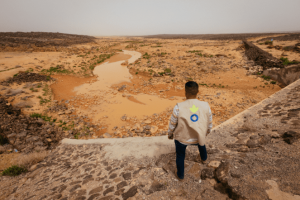

Your browser is not up to date.
If you wish to view the Action Against Hunger website correctly, update your browser.
Find the latest versions of supported browsers listed below.
No matching results…
No results seem to match what you are looking for, please modify your search.
 © Brian Kimanthi pour Action contre la Faim
© Brian Kimanthi pour Action contre la Faim
Headline
The new water system is a game-changer, especially for women like Regina. Her walk to collect water is now just eight minutes long – and she can fill her jerrican in three minutes. With the old hand pump, “we would pump for 30 minutes or more to fill a 20-liter jerrican”, recalls Regina.
Instead of long walks and time spent pumping water, women in Chesoyow can now spend their time caring for their children and earning an income. Each afternoon near the borehole, women gather to sell food, make beads, and share stories.
The water supply pipeline system was also extended to reach the local schools. No child will have to miss class to search for water – and the community is confident that attendance rates will improve. “Initially, the school would record at least 50% absenteeism due to lack of water, and sometimes students would miss classes for more than two hours in search of water, but now this has changed,” says Regina.
The village selected Regina as the chair of the local water management committee, which Action Against Hunger and our partners trained to operate and maintain the water system. Local investment in the water committee has shifted the community’s mindset. Everyone is determined to keep their water source working well and people no longer see borehole maintenance as the county government’s responsibility, but their own.
“We are in the process of registering a group and opening a bank account to save our monthly contributions to pay for the borehole future repairs,” says Regina, due to training that she and other committee members received.


The rehabilitated and solar-powered borehole is source of joy for the village’s residents. Seeing water running continuously for months has been a dream come true – water has made life happier and brighter. Regina is passionate about the borehole, proud of her role on the water committee, and promises to protect the community’s water.
“I am so grateful to Action Against Hunger for upgrading this borehole to solar. Water is life, we had lost it, but Action Against Hunger has restored it. From the training we received, we will ensure that this borehole is protected and that we never again lack water in our village,” says Regina
Kenya
All the news of our Action: articles, events, testimonials, press releases…